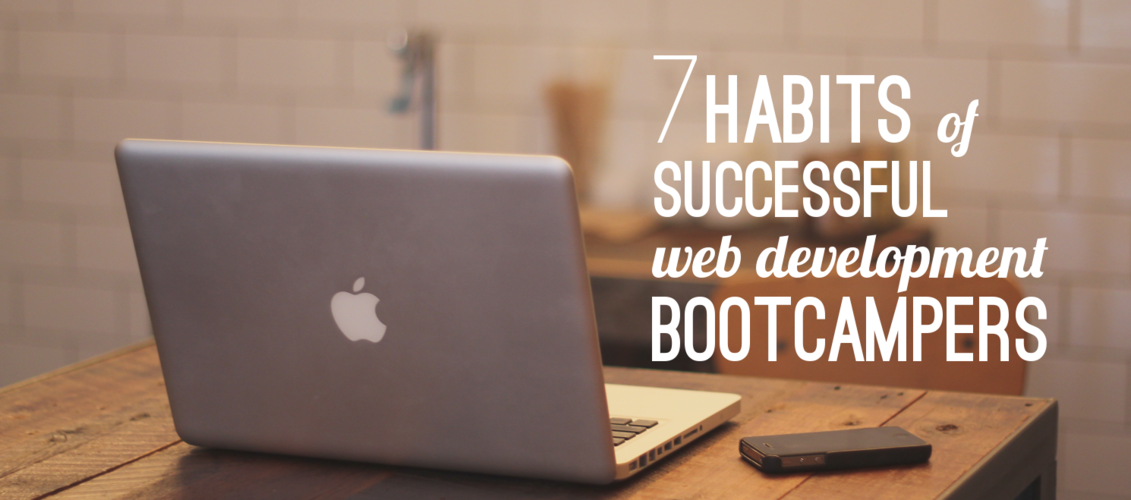blog article
7 Habits of Successful Web Development Bootcampers
![]()
Written By Steven Watkins
![]()
Written By Steven Watkins
Course Report strives to create the most trust-worthy content about coding bootcamps. Read more about Course Report’s Editorial Policy and How We Make Money.
Course Report strives to create the most trust-worthy content about coding bootcamps. Read more about Course Report’s Editorial Policy and How We Make Money.

We’ve heard the success stories from coding bootcampers, but attending a software development bootcamp is undoubtedly a brave endeavor. There's a lot at stake, including:
Fear not! As a former bootcamper myself now working with developers every day at Launch Academy, I’ve seen first-hand that the most successful bootcampers maintain certain habits that put them at the top of their class. Here are the seven habits I found effective.
In order to be successful in a fully immersive bootcamp, you have to know how and when you are most productive. It is critically important for you to align your work habits and preferences with your new atmosphere.
Say you're the type of person who works best in quiet environs, and your bootcamp's work area is an open space that tends to get noisy. Invest in some noise canceling headphones. Come in early or stay late when no one's around. This is also excellent practice for your first development job.
Your brain is your most valuable asset during your bootcamp experience. It needs the proper amount of rest and recuperation time in order to function efficiently. Bootcamp students should aim for 6 to 8 hours of sleep per night.
Economists talk about the law of diminishing returns performing cost/benefit analyses. There is a point when trying to do more and more work over a fixed period of time returns inferior results. The same phenomenon occurs to bootcamp students. Don't try to learn too much new information in a given day--especially late at night. Chances are you will not adequately retain what you're consuming.
Google is a software developer's best friend. You can ask it anything and the answer is almost guaranteed to appear on the first page.
Throughout your career as a software developer, you will be Googling almost every day. Using Google every day will further acclimate you with trusted programming resources, like Stack Overflow, language-specific documentation, and highly referenced blogs.
Yes, there are bad questions. In the event Google fails you, you'll need to ask your instructors questions.
You just paid money to learn how to become a software developer at an accelerated pace. Assuming you get a job at a tech company, you will need to know how to effectively seek help. What better place to develop this skill than at a bootcamp.
To help your instructors understand your concern, outline the steps you've gone through. The more context you provide, the easier the problem is to solve.
You'd be surprised how much more you learn by working with your classmates instead of working alone. Your classmates may have a better grip on a topic than you, and may have a unique way of explaining it that elicits a glorious "AHA!" moment.
Take time to help your classmates. Explaining challenging topics solidifies your own understanding. Also, talking about code in a comfortable, welcoming settings enhances your ability to talk about code in tough ones, like job interviews. If you can explain Big O notation or binary trees to your classmates, there's no reason you can't explain it to a potential employer.
Potential employers are looking for students who demonstrate a natural curiosity for how things work. Successful bootcamp students build side projects in their spare time, whether to reinforce curriculum-based topics or learn something entirely new. The more time you spend coding and challenging yourself, the more prepared you will be to enter the workforce.
Bootcamp students come from all walks of life. Some students have prior programming experience, but the majority don't. When you compare yourself to your classmates, you're only hurting yourself.
Students' levels of achievement vary throughout a bootcamp session. There are topics that some people will struggle with that you might not, and vice versa. If you compare yourself to the best student in your class, you are forgetting about all of the amazing things you have accomplished. Getting through a day in a bootcamp is an accomplishment in its own right.
Everyone is unique in how they approach their bootcamp experience. In order to maximize the return on your investment, it's best to be prepared. Developing consistent routines and practicing good habits will help you get the most out of every day. Your time at a bootcamp will go by really quickly. Diligence and good habits will ensure a worthwhile experience.
Steven Watkins is a Launch Academy alumnus and currently serves as their Developer Evangelist. Keep up with him on Twitter!

Steven Watkins is a Launch Academy alumnus and currently serves as their Developer Evangelist. Keep up with him on Twitter. .
Sign up for our newsletter and receive our free guide to paying for a bootcamp.
Just tell us who you are and what you’re searching for, we’ll handle the rest.
Match Me